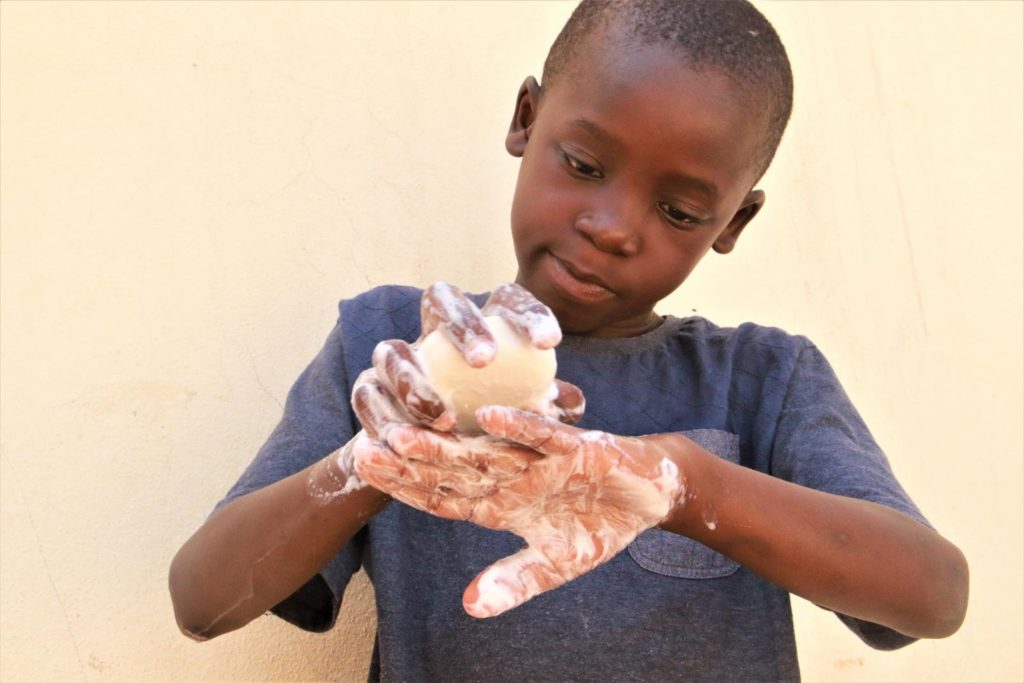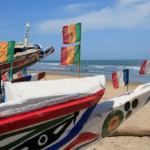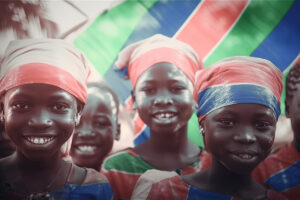UNICEF: COVID-19 and our response
Part of our response strategy is to promote personal hygiene – hand washing with soap and water – which is vital to staying safe from the Coronavirus.

As the pandemic spreads, prioritization and sequencing of response measures are crucial. UNICEF The Gambia is rapidly scaling up and striving to maintain continuity of programmes and operations while responding and adapting to the COVID-19 pandemic and its impact. We are committed to delivering assistance to children and women together with government and partners, to ensure all children in need receive humanitarian assistance and proper support to cope with the impact of the crisis. We are working to strengthen the public health response to reduce coronavirus transmission and mortality, while monitoring and responding to the socio-economic impact on children and families, especially the most disadvantaged, as the pandemic and efforts to contain it disrupt access to health care, learning, protection and other services essential to children’s rights and well-being.
Keep children healthy
As the COVID-19 continues to upend the lives of hundreds of thousands of children in The Gambia, one of our key priorities is to shore up health system capacities to maintain routine immunization, maternal, new-born, young child and adolescent care, HIV treatment, nutrition services and capacities to respond to other life-threatening diseases, such as pneumonia. In addition, we are also strengthening risk communication and community engagement (RCCE) to ensure children and their families know how to protect themselves from COVID-19 and know how to seek assistance. And to keep everyone safe and healthy, we invest in skilling frontline health workers who play a crucial role in the COVID-19 response
Reach vulnerable children with water, sanitation and hygiene (WASH)
Part of our response strategy is to promote personal hygiene – handwashing with soap and water – which is vital to staying safe from the Coronavirus. We are providing WASH services and supplies to dozens of health facilities, border posts, and other public hubs to ensure using these spaces is safe from the Coronavirus. We are also working with The Gambia Government and partners to ensure children and their families continue to access essential infection prevention and control, WASH and medical supplies. At regional and community levels, we support local water and sanitation authorities to ensure continuity, quality and affordable access to WASH services for the poorest and most vulnerable families.
Keep children learning
One of the biggest disruptions caused by the COVID-19 is the closure of schools – schools everywhere have been closed and children are missing out on important classroom lessons. To support the continuity of learning while schools are closed, we work with the Ministry of Basic and Secondary Education and other education partners to provide large-scale and inclusive distance learning for students across The Gambia. We also invest in and prioritise internet connectivity – radio coverage in rural and underserved areas, ensure protective services provided at schools continue at home, and invest in skilling frontline education and social service workers, and businesses to support parents.
Where schools reopen, we advocate for the implementation of the guidelines for safe school operations and take special measures to close any learning gaps, including enabling pathways back to school for the most vulnerable.
Support families to cover their needs and care for their children
Due to the lockdown, families could face severe economic hardships. To ensure children and their families have access to basic supplies, we provide support in strengthening shock-responsive social protection systems, considering the impact of COVID-19 on remittance flows as a key source of household income. We work to ensure access to services to cover basic needs for families affected by a loss of income, including through the provision of emergency cash transfer/voucher, the expansion of existing social protection provisions, and adjusting and/or scaling up cash. As part of our social protection support, we advocate for the inclusion of the most vulnerable children and households in national/global social and economic recovery measures adopted in response to COVID-19.
We invest in rapid data collection, analysis and development of evidence-based strategies to measure the outbreak’s impact on children and families and enable adaptive programming; care for the caregivers and support their physical, emotional and mental health including through information and communication campaigns; promote positive parenting and provide parenting content and activities for parents, in local languages, safely and easily accessible; and monitor and measure children’s developmental status (ECD) within four domains: literacy-numeracy, physical, and social-emotional development.
Protect children from violence, exploitation and abuse
The social restrictions associated with the COVID-19 expose children and mothers to violence, stigmatization and discrimination at home and online. To keep children and their families safe from violence, abuse and discrimination, we invest in the social service workforce as key actors of the COVID-19 response and train health, education and social service workers; support the strengthening of national protection services, safe and trusted response and referral mechanisms for female genital mutilation (FGM), gender-based violence and psychosocial services response; ensure that all children affected by COVID-19 – including migrant children – have access to adequate alternative care arrangements and protection services; scale up access and availability of mental health and psychosocial support by integrating mental health and psychosocial support services across all sectors and promoting access to quality services; and speak up proactively against xenophobia, stigma, and discrimination everywhere
Source: https://www.unicef.org/gambia/coronavirus-disease-covid-19






